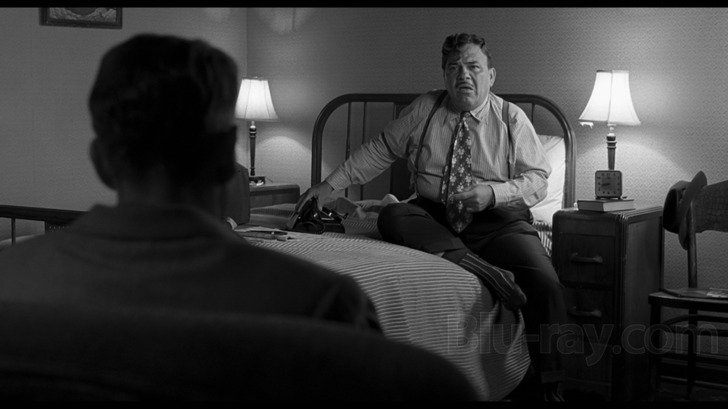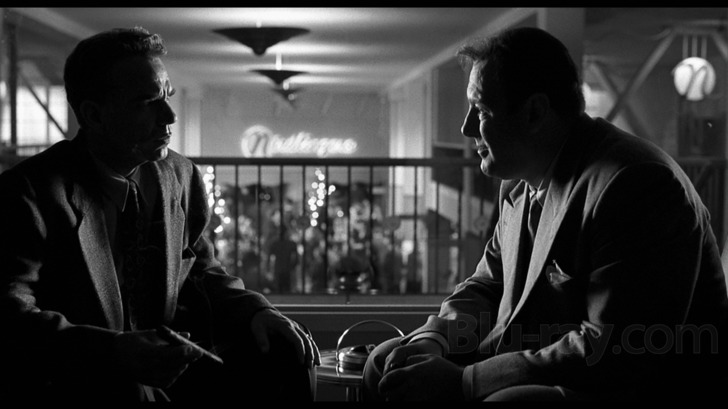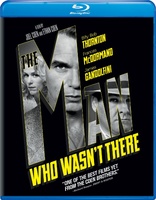The Man Who Wasn't There Blu-ray Movie
HomeThe Man Who Wasn't There Blu-ray Movie 
Universal Studios | 2001 | 116 min | Rated R | Sep 08, 2015Movie rating
7.4 | / 10 |
Blu-ray rating
| Users | 0.0 | |
| Reviewer | 4.0 | |
| Overall | 4.0 |
Overview
The Man Who Wasn't There (2001)
In a small 1949 California town, a barber turns to blackmail and revenge to escape his achingly dull life.
Starring: Billy Bob Thornton, Frances McDormand, Michael Badalucco, James Gandolfini, Katherine BorowitzDirector: Joel Coen, Ethan Coen
| Drama | Uncertain |
| Film-Noir | Uncertain |
| Dark humor | Uncertain |
| Period | Uncertain |
| Crime | Uncertain |
Specifications
Video
Video codec: MPEG-4 AVC
Video resolution: 1080p
Aspect ratio: 1.85:1
Original aspect ratio: 1.85:1
Audio
English: DTS-HD Master Audio 5.1 (48kHz, 24-bit)
Subtitles
English SDH
Discs
50GB Blu-ray Disc
Single disc (1 BD)
Playback
Region free
Review
Rating summary
| Movie | 4.5 | |
| Video | 3.5 | |
| Audio | 4.0 | |
| Extras | 4.0 | |
| Overall | 4.0 |
The Man Who Wasn't There Blu-ray Movie Review
Who Is Ed Crane?
Reviewed by Michael Reuben September 11, 2015The Man Who Wasn't There (or "TMWWT") tends to get lost in the Coen Brothers' filmography. Released in 2001, it followed three films that are acknowledged Coen classics, even if one of them (The Big Lebowski) flopped in theaters. The other two, Fargo and O Brother, Where Art Thou?, began the connection with mainstream audiences that would eventually result in the success of No Country for Old Men and True Grit. But TMWWT is one of those small, intimate pictures that, despite the praise of critics and film enthusiasts, leaves most viewers scratching their heads and wondering what they just saw. The Coens' Inside Llewyn Davis is a recent example. Because TMWWT was made in black-and-white, is set in 1949 and repeatedly references film noir, it is often treated as a homage to the genre, but the Coens already did that with their first film, Blood Simple—and even in that impressive debut, it was already evident that whatever filmmaking conventions the brothers happened to adopt were transformed by their distinctive vision into something uniquely personal, something that no one else could have made. In their gangster film, Miller's Crossing, the Irish weren't particularly Irish, the Italians weren't particularly Italian and the city was so generic that it was obviously a backlot. The people and places existed in an alternate universe of cinematic imagination. The same was true for the Coens' version of screwball comedy in The Hudsucker Proxy, or the country music scene in O Brother, Where Are Thou?, or Minnesota's winter landscape in Fargo, or the stoner L.A. of The Big Lebowski. No matter the inspiration, all of these places are different colored pins stuck in a map labeled "Coen-ville". TMWWT is the B&W pin, now finally receiving its Blu-ray release.

Utilizing a familiar film noir technique, TMWWT is narrated in voiceover by its protagonist, a barber in post-war Santa Rosa, California. In the film itself, Ed Crane says very little, and Billy Bob Thornton delivers a skillfully minimalist performance, as Ed barely reacts to what's going on around him. Tiny gestures and flickers of expression assume great significance. On the rare occasion when Ed actually expresses something, the contrast with his usual demeanor is startling. The circumstances in which Ed is telling his story are not explained until the end, and he is a good enough narrator that it takes a while to notice that he reveals nothing about his past. We never learn where he came from or how he grew up. He appears to have no family besides his wife, Doris (Frances McDormand), and no friends other than casual contacts made through work. As Ed says, sooner or later everybody needs a haircut, which means that he's seen most of the men and boys in town. Ed himself is rarely recognized when he isn't wearing a barber's smock. He works the second chair in the shop owned by Doris' brother, Frank (Michael Badalucco), and his social life is limited to Doris' family functions and dinner with her boss, "Big Dave" Brewster (James Gandolfini), and his wife, Ann (Katherine Borowitz), whose family owns the local department store, Nirdlingers, where Doris is the bookkeeper. Dave manages the store. He's a classic man's man, who smokes cigars and tell tales of fighting World War II with the Pacific fleet. He's everything that Ed is not. The plot of TMWWT resembles that of Fargo, in that a business opportunity prompts someone to stage a crime to raise money for investment. The crime is supposed to be victimless, but it quickly spirals out of its planner's control. The business prospect is represented by one Creighton Tolliver (Coen regular Jon Polito), who is looking for a partner to fund his dry cleaning business. When the would-be partner's efforts result in death and disaster, Ed Crane can do nothing but stand by helplessly and observe events unfold, as if they were happening to someone else. TMWWT lacks the voice of reason and normalcy that Marge Gunderson provided in Fargo, offering perspective and, ultimately, reassurance that the world is mostly a decent place. What TMWWT has instead is a hyperactive defense lawyer named Freddy Riedenschneider (Tony Shaloub), a character who undoubtedly owes something to Hume Cronyn's shrewd Arthur Keats in The Postman Always Rings Twice. Recommended by local attorney Walter Abundas (Richard Jenkins), Riedenschneider gives the film a jolt of energy but offers nothing in the way of clarity. Distraction and misdirection are his stock-in-trade. In a classic moment of Coen wit, Riedenschneider concocts an entire defense based on the Heisenberg Uncertainty Principle even when he can't recall Heisenberg's name (it could be Werner, but he's not certain). The sole person who draws any kind of emotional reaction from Ed is Walter Abundas' daughter, Birdy (Scarlett Johansson), but it isn't so much Birdy herself that moves Ed as her piano playing. Maybe he finds Beethoven a respite from the daily nattering around him. Whatever the reason, Ed takes an interest in Birdy that the precocious teenager mistakes for a sexual attraction. If it were anyone other than Ed, she would probably be right. By several people in different circumstances, Ed Crane is asked the same question: "What kind of man are you?" It's an apt question without an obvious answer. While Ed may appear thoroughly ordinary on the surface, so much so that he fades into the background, on closer inspection, one of Freddie Riedenschneider's aphorisms applies: "The more you look, the less you really know." One character believes that aliens have infiltrated society and the government. The poor person seems deranged, but the recurrent outer space motif recalls another famous black-and-white movie where people who looked just as normal as Ed Crane turned out to be space creatures hatched from pods. The man at the center of TMWWT may not be an alien, but he's so thoroughly alienated from the world around him (and himself) that he remains a cypher, even as the film's bizarre events unfold around him. He's one of the Coens' most mysterious characters, which is no small distinction.
The Man Who Wasn't There Blu-ray Movie, Video Quality 

The Man Who Wasn't There was shot by Roger Deakins, the Coens' regular cinematographer since Barton Fink; it garnered Deakins his fifth Oscar nomination (of twelve to date) and won him that year's award for theatrical releases from the ASC. In the interview included with the extras, Deakins provides a detailed account of the process of filming on color stock, then converting the image to black-and-white in post-production. The use of color stock complied with contractual requirements to deliver a color version for use abroad, but it also allowed Deakins greater flexibility in lighting. Universal Home Video's 1080p, AVC-encoded Blu-ray provides a decent representation of Deakins' evocative compositions, although it does not appear to be a new transfer. (There is some telltale wobbling during the closing credits that would not be present on a scan performed with current technology.) Blacks are solid and deep, and the contrast varies from stark to subtle, depending on the scene. For example, Freddy Riedenschneider's "uncertainty principle" speech is delivered in a room sharply bisected by shafts of hot, white light, whereas Ed first hears Birdy play the piano in a gently illuminated display area at Nirdlingers. Shades of grey are finely delineated, and detail is plentiful except where it is deliberately hidden, either by shadow or by bright light. Noise and interference are minimal, but some light electronic sharpening (and, in a few scenes, more than light) has been applied, which occasionally coarsens the film grain. Detail is generally very good; a few scenes appear softer than others, but this may be a result of the post-production processing. Universal has mastered TMWWT with an average bitrate of 34.87 Mbps, and the compression has been carefully performed.
The Man Who Wasn't There Blu-ray Movie, Audio Quality 

TMWWT's original 5.1 sound mix has been encoded in lossless DTS-HD MA, but the track isn't a sonic showcase. Like the film's protagonist, it's quiet but rewards close attention. Supervising sound mixer and editor Skip Lievsay (an Oscar winner for Gravity) has picked out individual effects to complement and emphasize specific moments, such as the sound of scissors cutting hair that accompanies Ed Crane's introduction of himself and the barbershop. Ed's voiceover, soothing and clear, floats above the dialogue, which runs the gamut from conversational to highly emotive, but is always intelligible (even Riedenschneider's gibberish). The Coens' usual composer, Carter Burwell, wrote the haunting theme, but most of the scoring consists of classical piano music by Beethoven.
The Man Who Wasn't There Blu-ray Movie, Special Features and Extras 

The extras have been ported over from Universal's 2001 DVD of TMWWT. The sole omission is the behind-the-scenes photo gallery.
- Commentary with Billy Bob Thornton and Joel and Ethan Coen: This is a fascinating commentary, because the filmmakers and their star are so obviously in sync that their conversation provides a sense of eavesdropping on the creative process. They don't discuss themes, motivation or back story. Instead, they talk about gestures such as "the Ed nod" (which they would debate whether or not Thornton should give in a particular scene) or the decision to keep one side of a conversation in darkness. Thornton also relates interesting reactions he has heard from viewers.
- Deleted Scenes (480i; 1.85:1; 4:02): Except for the "opening argument", which Ethan Coen describes in the commentary as "gibberish", these trims are brief inserts.
- Riedenschneider's Opening Argument
- The Timberline
- The Duck Butt
- The Alpine Ropetoss
- Doris' Salad
- Making The Man Who Wasn't There (480i; 1.33:1; 16:23): This EPK is an interesting collection of interviews with McDormand, Thornton, Gandolfini, Badalucco, Shaloub and the two Coens, combined with onset footage. Excerpts from the Deakins' interview listed below are also included.
- Interview with Cinematographer Roger Deakins (480i; 1.33:1; 46:19): This lengthy interview should be required reading for anyone interested in the art of cinema. Deakins speaks not only about the technical challenges of making TMWWT, but also about his philosophy of moviemaking and what he strives to achieve in creating an image.
- Theatrical Trailer (480i; 1.85:1; 1:38)
- TV Spots (480i; 1.33:1)
- Spot 1 (0:32)
- Spot 2 (0:17)
The Man Who Wasn't There Blu-ray Movie, Overall Score and Recommendation 

At the 2001 Cannes Film Festival, Joel Coen and David Lynch tied for the Best Director award. Lynch was represented by Mulholland Drive and Coen by The Man Who Wasn't There. It's an interesting pairing, because both films share a dreamy, surreal texture and a protagonist whose identity is open to question (though in very different ways). Leave it to the French to recognize in Ed Crane a kindred spirit to the anti-heros of such existential classics as Camus' L'Étranger and Sartre's La Nausée. Then again, maybe they just find the film amusing (which it is). Either way, it's ripe for rediscovery, and Universal's Blu-ray is good enough to recommend.
Other editions
The Man Who Wasn't There: Other Editions
Similar titles
Similar titles you might also like

The Dark Corner
1946

The Postman Always Rings Twice
1946

Kansas City Confidential
1952

Kiss Tomorrow Goodbye
1950

Beyond a Reasonable Doubt
1956

Fargo 4K
Collector's Edition
1996

Miller's Crossing
1990

The Crooked Web
1955

She Played with Fire
1957

The Man I Love
Warner Archive Collection
1947

Too Late for Tears
1949

99 River Street
Special Edition
1953

The File on Thelma Jordon
1950

The Letter
Warner Archive Collection
1940

The Strange Love of Martha Ivers
4K Restoration
1946

Force of Evil
4K Restoration
1948

So Evil My Love
1948

Impact
Collector's Edition
1949

I Wake Up Screaming
Hot Spot
1941

Mystery Street
Warner Archive Collection
1950


